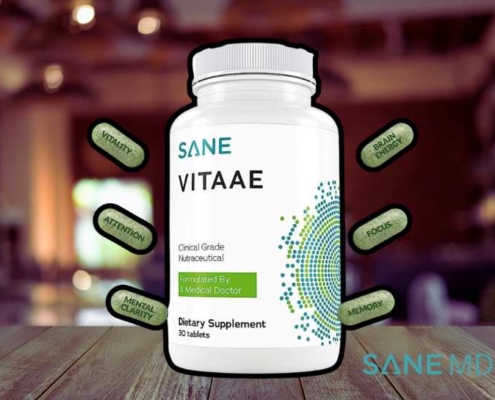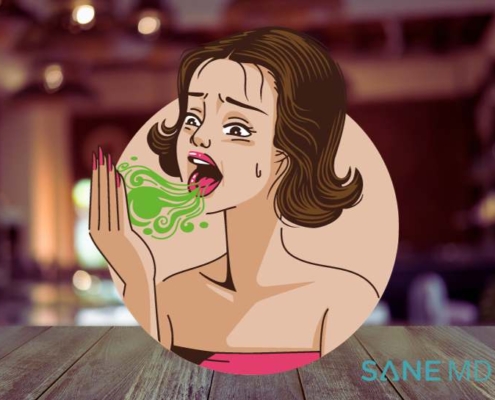ANSWER: Here is two ways to ultimately handle GERD Permanently:
- Surgical intervention (see a general surgeon or bariatric surgeon in your area
- Lifestyle modifications and medications that are permanent
To permanently alleviate GERD, consider implementing effective home remedies and lifestyle adjustments. Prioritize the avoidance of trigger foods, maintain an upright posture after meals, work on achieving a healthy weight through exercise, and, if applicable, quit smoking and limit alcohol intake.
In severe instances, surgical intervention may be considered as a potential solution for a long-lasting GERD cure.
Are you tired of dealing with constant heartburn, chest pain, and that bitter taste in your mouth? You’re not alone. Gastroesophageal reflux disease (GERD) affects millions of people worldwide, causing discomfort and disrupting their daily lives. The good news is that there are ways on how to cure GERD permanently and regain control of your life. In this comprehensive SANE MD treatment guide, we’ll explore the causes, symptoms, and various treatment options to help you find relief from this chronic digestive disorder (check out our desiccated liver guide for more info here)
Key Takeaways
- GERD is a chronic digestive disorder caused by the improper functioning of the lower esophageal sphincter.
- Lifestyle modifications such as dietary changes, exercise and stress management can help relieve symptoms.
- Identifying and avoiding triggers, maintaining a healthy lifestyle and seeking professional medical advice are key to preventing GERD recurrence.
Understanding GERD: Causes and Symptoms
Imagine a faulty door that allows water to seep through, even when it’s supposed to be closed. That’s what happens in your digestive system when you have GERD. The lower esophageal sphincter (LES), a ring of muscle at the entrance to your stomach, is supposed to close after food passes through, but when it doesn’t function properly, stomach acid can flow back into the esophagus, causing acid reflux and a range of unpleasant symptoms such as heartburn, chest pain, and regurgitation.
This condition is known as gastroesophageal reflux disease (GERD), a chronic digestive disorder that can significantly impact your quality of life.
Causes of GERD
Several factors can contribute to the development of GERD, including:
- Obesity
- Pregnancy
- Smoking
- Certain medications
Carrying extra weight, especially around the abdomen, puts pressure on the stomach and weakens the LES, making it more likely for stomach acid to flow back into the esophagus.
Similarly, there are several factors that can increase the risk of GERD, including:
- Pregnancy, due to the added pressure on the stomach and weakening of the LES
- Smoking, which has a negative effect on the lower esophageal sphincter (LES) and weakens the barrier
- Certain medications, such as nonsteroidal anti-inflammatory drugs (NSAIDs), which may be linked to GERD
Effectively treating GERD and achieving long-lasting relief requires the identification and management of these factors.
Common Symptoms
GERD symptoms can range from mild to severe and can be occasional or chronic, depending on the individual. Some common symptoms include:
- Heartburn, a burning sensation in the chest that often occurs after eating and may worsen when lying down
- Regurgitation, the feeling of stomach contents flowing back into the throat or mouth
- Chest pain that can sometimes be mistaken for a heart attack
Additionally, GERD may cause difficulty swallowing, a sour or bitter taste in the mouth, and even chronic cough or sore throat. Recognizing these symptoms is the first step towards finding an effective treatment plan and achieving relief from GERD.
Lifestyle Modifications for GERD Relief
Lifestyle modifications are often the first line of treatment for GERD, as they can help alleviate symptoms and improve overall digestive health without the need for medication. Adjusting your diet, incorporating regular exercise, and managing stress are all key factors in reducing GERD symptoms and improving your quality of life.
We’ll delve into each of these lifestyle changes in more detail, demonstrating how they can help control your GERD symptoms and provide enduring relief.
Diet and Food Choices
Your diet is a significant factor in managing GERD. Certain foods and beverages, such as spicy or fatty foods, caffeine, and carbonated beverages, are known to trigger GERD symptoms. Identifying and avoiding these trigger foods is vital to help reduce acid reflux. Keeping a food diary can be a helpful tool in identifying which foods cause your symptoms to flare up.
In addition to avoiding trigger foods, eating smaller, more frequent meals can also help reduce acid reflux by minimizing the pressure on the LES. Wearing loose-fitting clothing, particularly around the waist, can also help alleviate pressure on the stomach and reduce acid reflux.
Exercise and Weight Loss
Maintaining a healthy weight and engaging in regular exercise can have a significant impact on your GERD symptoms. Extra weight, particularly around the abdomen, can put pressure on the stomach and LES, making it more likely for stomach acid to flow back into the esophagus. To help alleviate GERD symptoms, it’s important to lose weight if you are carrying extra pounds.
Physical activity, such as:
- walking
- light jogging
- yoga
- swimming
- resistance training
can help to strengthen your overall digestive system and reduce the pressure on the LES, thus alleviating GERD symptoms. Choosing exercises that are gentle on the digestive system and avoiding high-impact activities that may exacerbate acid reflux is vital.
Stress Management
Stress is an often-overlooked factor in GERD symptoms, as it can lead to increased production of stomach acid and exacerbate the condition. Managing stress through relaxation techniques and mindfulness practices can help alleviate GERD symptoms by:
- Reducing the amount of acid generated in the stomach
- Promoting overall digestive health
- Improving sleep quality
- Enhancing overall well-being
Deep breathing exercises, meditation, and yoga are all effective ways to manage stress and improve overall well-being, potentially reducing GERD symptoms. Incorporating stress management techniques into your daily routine not only improves your digestive health but also enhances your overall quality of life.
Medication Options for GERD Treatment
When lifestyle modifications are not enough to manage GERD symptoms, medication may be necessary to provide relief and prevent complications. Both over-the-counter and prescription medications can be effective in managing GERD symptoms, but it’s important to consult with a healthcare provider before starting any medication.
This section will examine various medication options for GERD treatment and discuss their potential to enhance your quality of life.
Over-the-Counter Medications
Over-the-counter medications, such as antacids, H2 blockers, and proton pump inhibitors (PPIs), can provide temporary relief from GERD symptoms by neutralizing stomach acid or reducing acid production. Antacids, for example, work by neutralizing stomach acid to provide quick relief from heartburn and other symptoms of acid reflux. However, they should be used with caution and under a doctor’s guidance, as overuse can lead to potential side effects, such as diarrhea or constipation. To neutralize stomach acid effectively, it is essential to follow the recommended dosage and consult a healthcare professional if symptoms persist.
H2 blockers, on the other hand, reduce the amount of acid produced by the stomach and can provide short-term relief from GERD symptoms. These medications should also be used with care and under a physician’s supervision, as they may interact with other medications and cause side effects.
Proton pump inhibitors (PPIs) suppress the secretion of gastric acid and can provide temporary relief from GERD symptoms. Like other over-the-counter medications, PPIs should be used with caution and under a physician’s supervision to avoid potential side effects and drug interactions.
Prescription Medications
For more severe cases of GERD, prescription medications may be necessary to provide more effective symptom relief. Prescription-strength PPIs, such as esomeprazole, pantoprazole, and rabeprazole, as well as H2 blockers like famotidine and nizatidine, are commonly used to treat GERD. These medications work by reducing acid production in the stomach, providing relief from heartburn and other symptoms of acid reflux.
However, awareness of potential side effects associated with prescription medications for GERD is necessary. Common side effects include headaches, nausea, and diarrhea.
Always consult with your healthcare provider before starting any prescription medication for GERD, and be sure to follow their recommendations for dosing and monitoring.
Alternative Therapies for GERD Management
In addition to conventional treatments, alternative therapies may also be beneficial for managing GERD symptoms. Herbal remedies, probiotics, and mind-body practices can be used alongside medications and lifestyle modifications to help improve your overall digestive health and find relief from GERD.
This section will delve into these alternative therapies and discuss their potential to manage your GERD symptoms more effectively.
Herbal Remedies
Herbs like slippery elm, chamomile, and licorice root have been used for centuries to provide relief from digestive issues, including GERD. These herbs are believed to soothe and protect the digestive tract, reducing inflammation and irritation caused by stomach acid. However, it’s important to note that the effectiveness of herbal remedies for GERD relief has not been scientifically verified. As such, it’s crucial to use these remedies with caution and under the guidance of a healthcare provider.
Consulting with your healthcare provider is vital before incorporating herbal remedies into your GERD treatment plan to ensure they don’t interact with any medications you’re currently taking or cause any adverse effects. Additionally, be sure to purchase herbal supplements from reputable sources to ensure they are of high quality and free from contaminants.
Probiotics
Probiotics are live microorganisms that can help improve gut health and may reduce GERD symptoms when used in conjunction with other treatments. These beneficial bacteria can be found in certain foods, such as yogurt, kefir, and fermented vegetables, or taken as dietary supplements. Probiotics may help to improve digestion, reduce inflammation, and promote a healthy balance of gut bacteria, all of which can contribute to reduced GERD symptoms.
As with herbal remedies, it’s important to consult with your healthcare provider before incorporating probiotics into your GERD treatment plan. They can help you determine the best type of probiotic for your needs and ensure they won’t interact with any medications you’re currently taking. Be sure to choose high-quality probiotic supplements from reputable sources and follow the recommended dosing guidelines to ensure the best results.
That being said – we at SANE MD recommend you take a look at the real thing and pick up a bottle of Viscera-3 which is a true postbiotic!
Mind-Body Practices
Mind-body practices, such as deep breathing exercises, meditation, and yoga, can help manage stress and improve overall well-being, potentially reducing GERD symptoms. These practices can help to relax the body and mind, reducing the production of stress hormones that can contribute to increased stomach acid production and GERD symptoms.
Integrating mind-body practices into your daily routine can enhance both your digestive health and overall quality of life. Consider trying different techniques, such as guided meditation, diaphragmatic breathing exercises, or gentle yoga poses, to find the practices that work best for you and help you manage your GERD symptoms more effectively.
Surgical Interventions for Severe GERD
In cases where lifestyle changes and medications are not effective in managing GERD symptoms, surgical interventions may be necessary to provide long-lasting relief. Surgical options like fundoplication and Transoral Incisionless Fundoplication (TIF) can help to strengthen the lower esophageal sphincter and prevent stomach acid from flowing back into the esophagus, effectively reducing GERD symptoms.
This section will examine these surgical options and discuss their potential to provide enduring relief from GERD symptoms.
Fundoplication
Fundoplication is a surgical procedure that strengthens the lower esophageal sphincter, reducing acid reflux and GERD symptoms. During the procedure, the upper portion of the stomach is wrapped around the lower esophagus to reinforce the junction and prevent stomach acid from flowing back into the esophagus. This can help to reduce or eliminate symptoms associated with GERD and reduce the risk of complications, such as esophagitis, Barrett’s esophagus, and esophageal cancer.
However, like any surgical procedure, fundoplication carries risks, including infection, bleeding, and damage to the esophagus or stomach. Additionally, there is a possibility that the procedure may not be successful, or GERD symptoms may return after the procedure.
It’s important to discuss these risks with your healthcare provider and weigh the potential benefits and drawbacks before deciding on fundoplication as a treatment option for your GERD.
Transoral Incisionless Fundoplication (TIF)
Transoral Incisionless Fundoplication (TIF) is a minimally invasive procedure that provides long-lasting relief from GERD symptoms without the need for incisions. The lower esophageal sphincter can be tightened during the procedure. This is done by forming a partial wrap around the lower esophagus with polypropylene fasteners. TIF has a rapid recovery period and a high level of tolerance, making it an attractive option for many patients seeking relief from GERD symptoms.
As with fundoplication, it’s important to discuss the potential risks and benefits of TIF with your healthcare provider before deciding on this treatment option for your GERD. Understanding the potential risks and benefits of TIF can help you make an informed decision about whether this procedure is right for you and ensure the best possible outcome in managing your GERD symptoms.
Preventing GERD Recurrence
Preventing GERD recurrence requires ongoing commitment to the lifestyle changes and treatments that have been effective in managing your symptoms. Identifying and avoiding triggers, as well as maintaining a healthy lifestyle, can help prevent GERD from recurring and ensure long-lasting relief from this chronic digestive disorder. By following these steps, it is possible to cure GERD permanently and enjoy a life free from its symptoms.
This final section will outline strategies for preventing GERD recurrence and maintaining your digestive health.
Identifying and Avoiding Triggers
As mentioned earlier, certain foods and beverages can trigger GERD symptoms, so identifying and avoiding these triggers can help prevent recurrence. Keeping a food diary can be a helpful tool in identifying which foods cause your symptoms to flare up, allowing you to adjust your diet accordingly and reduce the risk of GERD recurrence.
Additionally, avoiding known trigger foods can help to prevent acid reflux and keep your GERD symptoms at bay. These trigger foods include:
- Fatty and fried foods
- Spicy foods
- Citrus fruits
- Tomatoes
- Garlic
- Onions
- Carbonated beverages
- Caffeine
Maintaining a Healthy Lifestyle
Continuing to practice healthy habits like regular exercise, stress management, and maintaining a balanced diet can help prevent GERD symptoms from returning. Regular physical activity not only helps to maintain a healthy weight but can also improve digestion and reduce stress, factors that can contribute to GERD symptoms.
Managing stress through relaxation techniques and mindfulness practices can also help to reduce the production of stomach acid and alleviate GERD symptoms. Maintaining these healthy lifestyle habits can aid in preventing GERD recurrence and ensure enduring relief from this chronic digestive disorder.
GERD is Curable, eh?
GERD is a chronic digestive disorder that can cause significant discomfort and disrupt daily life. However, by understanding the causes and symptoms, making lifestyle modifications, using medications, and exploring alternative therapies and surgical options, you can effectively manage your GERD symptoms and enjoy long-lasting relief. Remember, it’s important to consult with your healthcare provider before making any changes to your treatment plan to ensure the best possible outcome for your individual needs.
Take control of your GERD symptoms today and start living a healthier, more comfortable life. With the right treatment plan in place, you can cure GERD permanently and say goodbye to heartburn, chest pain, and that bitter taste in your mouth once and for all.
Frequently Asked Questions
1. What is the fastest way to cure GERD?
To cure GERD quickly, it is recommended to sleep in an inclined position, maintain a healthy weight, stop smoking, eat slowly and chew thoroughly, avoid trigger foods and drinks, and wear loose clothing.
2. Can you reverse GERD naturally?
Making lifestyle changes such as quitting smoking, maintaining a healthy weight, and staying in an upright position after meals may help reverse GERD naturally. If these don’t work, medications or surgery may be prescribed.
3. Can you live longer with GERD?
While GERD can be uncomfortable, it doesn’t have to affect your lifespan. With effective management, you can enjoy an improved quality of life.
4. What is the strongest medication for GERD?
The strongest medication for GERD is Proton Pump Inhibitors (PPIs), such as omeprazole and esomeprazole. They work by blocking the mechanism that produces stomach acid, thus reducing acidity of digestive fluids and reflux symptoms. Other prescription-strength treatments include Nexium, Prevacid, Prilosec, Protonix, Aciphex, and Dexilant.
5. What are the most common symptoms of GERD?
Common symptoms of GERD include heartburn, regurgitation and chest pain.
SANE MD TRENDING ARTICLES:
Dr. Matthew Olesiak, MD, is the Chief Medical Director at SANESolution, a renowned wellness technology company dedicated to providing evidence-based solutions for optimal living. Dr. Olesiak earned his medical degree from the prestigious Jagiellonian University Medical College in Kraków, Poland, where he developed a strong foundation in medicine.






